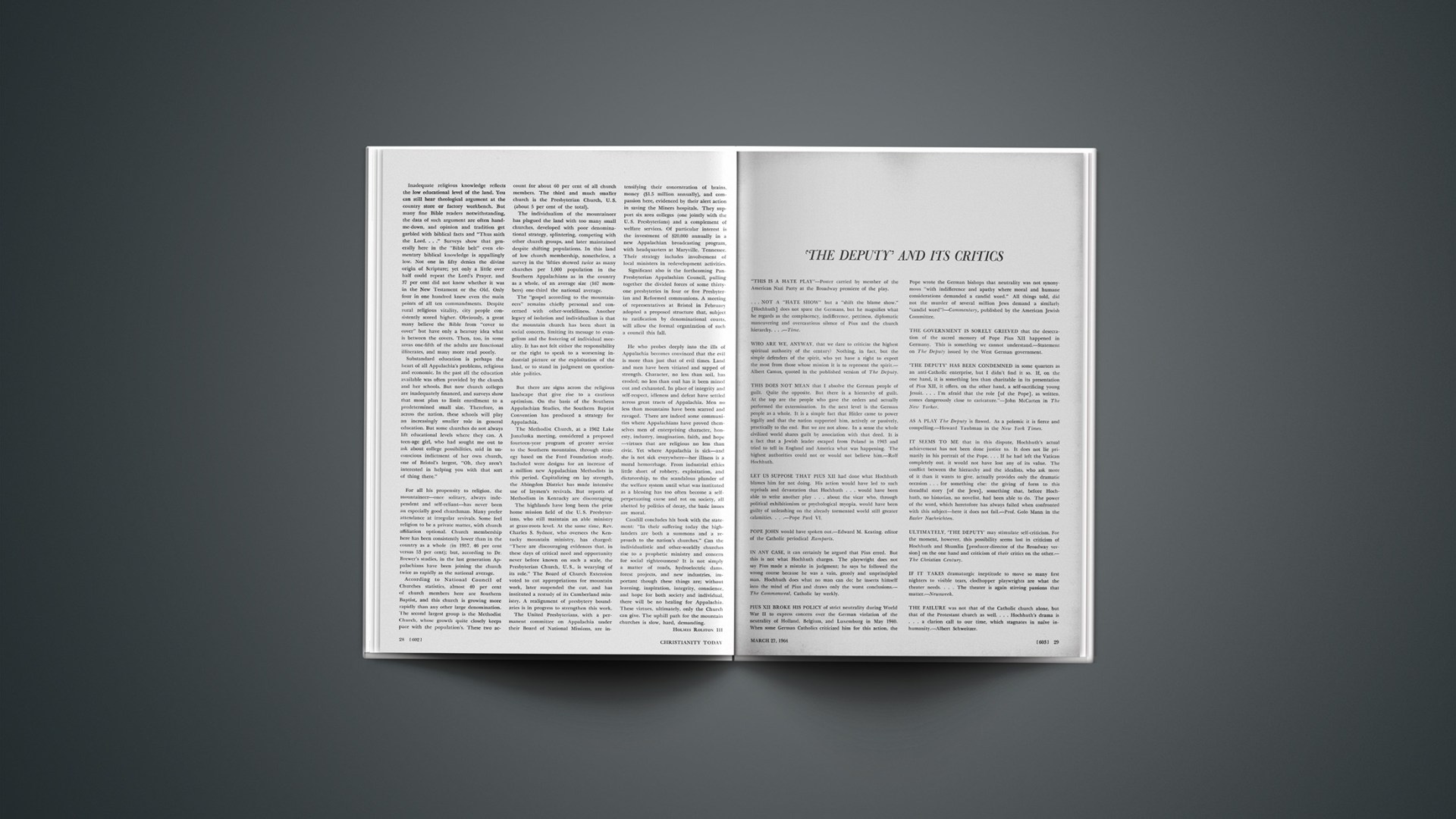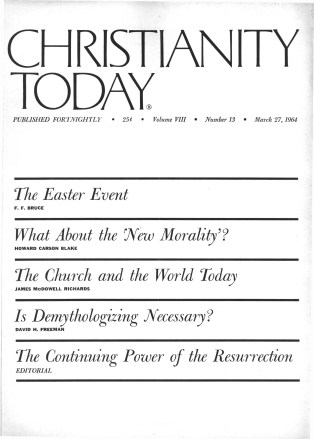“THIS IS A HATE PLAY”—Poster carried by member of the American Nazi Party at the Broadway premiere of the play.
… NOT A “HATE SHOW” but a “shift the blame show.” [Hochhuth] does not spare the Germans, but he magnifies what he regards as the complacency, indifference, pettiness, diplomatic maneuvering and overcautious silence of Pius and the church hierarchy.…—Time.
WHO ARE WE, ANYWAY, that we dare to criticize the highest spiritual authority of the century? Nothing, in fact, but the simple defenders of the spirit, who yet have a right to expect the most from those whose mission it is to represent the spirit.—Albert Camus, quoted in the published version of The Deputy.
THIS DOES NOT MEAN that I absolve the German people of guilt. Quite the opposite. But there is a hierarchy of guilt. At the top are the people who gave the orders and actually performed the extermination. In the next level is the German people as a whole. It is a simple fact that Hitler came to power legally and that the nation supported him, actively or passively, practically to the end. But we are not alone. In a sense the whole civilized world shares guilt by association with that deed. It is a fact that a Jewish leader escaped from Poland in 1943 and tried to tell in England and America what was happening. The highest authorities could not or would not believe him.—Rolf Hochhuth.
LET US SUPPOSE THAT PIUS XII had done what Hochhuth blames him for not doing. His action would have led to such reprisals and devastation that Hochhuth … would have been able to write another play … about the vicar who, through political exhibitionism or psychological myopia, would have been guilty of unleashing on the already tormented world still greater calamities.…—Pope Paul VI.
POPE JOHN would have spoken out.—Edward M. Keating, editor of the Catholic periodical Ramparts.
IN ANY CASE, it can certainly be argued that Pius erred. But this is not what Hochhuth charges. The playwright does not say Pius made a mistake in judgment; he says he followed the wrong course because he was a vain, greedy and unprincipled man. Hochhuth does what no man can do; he inserts himself into the mind of Pius and draws only the worst conclusions.—The Commonweal, Catholic lay weekly.
PIUS XII BROKE HIS POLICY of strict neutrality during World War II to express concern over the German violation of the neutrality of Holland, Belgium, and Luxemburg in May 1940. When some German Catholics criticized him for this action, the Pope wrote the German bishops that neutrality was not synonymous “with indifference and apathy where moral and humane considerations demanded a candid word.” All things told, did not the murder of several million Jews demand a similarly “candid word”?—Commentary, published by the American Jewish Committee.
THE GOVERNMENT IS SORELY GRIEVED that the desecration of the sacred memory of Pope Pius XII happened in Germany. This is something we cannot understand.—Statement on The Deputy issued by the West German government.
‘THE DEPUTY’ HAS BEEN CONDEMNED in some quarters as an anti-Catholic enterprise, but I didn’t find it so. If, on the one hand, it is something less than charitable in its presentation of Pius XII, it offers, on the other hand, a self-sacrificing young Jesuit.… I’m afraid that the role [of the Pope], as written, comes dangerously close to caricature.”—John McCarten in The New Yorker.
AS A PLAY The Deputy is flawed. As a polemic it is fierce and compelling.—Howard Taubman in the New York Times.
IT SEEMS TO ME that in this dispute, Hochhuth’s actual achievement has not been done justice to. It does not lie primarily in his portrait of the Pope.… If he had left the Vatican completely out, it would not have lost any of its value. The conflict between the hierarchy and the idealists, who ask more of it than it wants to give, actually provides only the dramatic occasion … for something else: the giving of form to this dreadful story [of the Jews], something that, before Hochhuth, no historian, no novelist, had been able to do. The power of the word, which heretofore has always failed when confronted with this subject—here it does not fail.—Prof. Golo Mann in the Basler Nachrichten.
ULTIMATELY, ‘THE DEPUTY’ may stimulate self-criticism. For the moment, however, this possibility seems lost in criticism of Hochhuth and Shumlin [producer-director of the Broadway version] on the one hand and criticism of their critics on the other.—The Christian Century.
IF IT TAKES dramaturgic ineptitude to move so many first nighters to visible tears, clodhopper playwrights are what the theater needs.… The theater is again stirring passions that matter.—Newsweek.
THE FAILURE was not that of the Catholic church alone, but that of the Protestant church as well.… Hochhuth’s drama is … a clarion call to our time, which stagnates in naïve inhumanity.—Albert Schweitzer.










